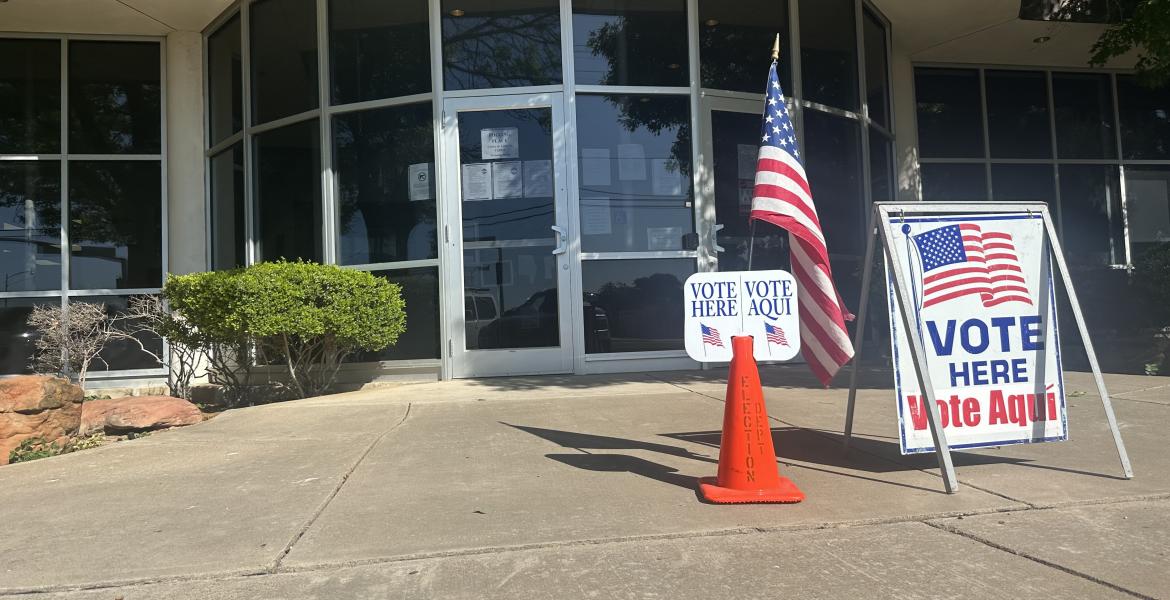While water issues may not have been a big agenda item at Tuesday’s City Council meeting, a presentation by the San Angelo Aqua Squad titled “Crisis of the Concho” managed to piss off at least one council member.
The presentation, given by the 7th and 8th graders that comprise the Aqua Squad this year, focused on water quality and levels locally and beyond. The group of 10 first addressed the quality and availability of resources in the area, then gave examples of current conservation measures.
“We are doing many things correctly, but we are also doing a couple of things incorrectly,” said one of the children mid-presentation. “One of the things we need to address is the fracking industry. Hydraulic fracturing, or fracking, is a process in which fresh water and chemicals are injected into the wells, fracturing the rock and releasing oil and gas. This process can cause natural gas to leak into nearby water sources, polluting them to the point where they can no longer be used,” he said.
The entire Aqua Squad presentation begins at the 40 minute mark in this video (advance the toggle to 40 minutes and press play):
[[{"fid":"507","view_mode":"default","fields":{"format":"default"},"type":"media","field_deltas":{"1":{"format":"default"}},"attributes":{"class":"media-element file-default","data-delta":"1"}}]]
It was this statement that caused San Angelo Councilman Winkie Wardlaw’s (SMD 5) brow to furrow in a stern reaction of rebuttal. Following the presentation, Wardlaw approached Christy Youker, the head of the Aqua Squad, and gave her a reaming for her socialist leanings.
Wardlaw told Youker that her Squad’s presentation was blatantly false and misrepresented the fracking industry, on which he is well informed. He suggested that Youker ‘have her kids talk to him some time to hear both sides of the story’ and firmly stated that “there has never been a single instance of water contamination due to fracking.” Concluding with the proud statement “I’m a capitalist, I’m not a socialist,” Wardlaw walked away.
When asked for comment on his opposition to the presentation, Wardlaw cut the question in half, “No,” he said. “You can find that out for yourself.” Further attempts proved just as useful as Wardlaw shooed the inquiry away with a flick of the hand and turned his back to continue a conversation.
Regardless of the appropriateness of Wardlaw’s reaction, there is truth in his position. Reports from the Texas Railroad Commission corroborate Wardlaw’s claim that the state has never seen a case of water contamination caused by hydraulic fracturing.
“The risk of contamination is minimal, very low,” says John Tintera, President of the Texas Water Recycling Association and former Railroad Commission executive. “The way that wells are designed—the Railroad Commission has employees that inspect them and issue a groundwater contamination report, “ he says. “The majority are from old sites and there’s not a single one from fracturing in the state.”
And while the stats may allay some concerns as to the future of groundwater resources in light of the present frac industry rage, the Aqua Squad is also perturbed by the usage of freshwater in hydraulic fracturing, and specifically the lack of incentive to recycle as opposed to disposal.
“According to a recent article in the Houston Chronicle, Luke Metzger of Environment Texas says ‘The legislature did pass a bill that encourages recycling, but it’s weak,’” the same Aqua Squad member continued. “As Metzger points out, it is still cheaper to just dispose of frac water in disposal wells, so most companies don’t have incentives to recycle.”
In the past year, numerous bills have come before the Texas Legislature in an attempt to encourage recycling on the behalf of oil companies. Some wanted to impose a tax of $0.01 per barrel, others focus on the liability issues of water possession.
Most recently, a bill passed that eliminates the need for a permit for operators to recycle produced water on their own leases or for the transfer to another lease for recycling. This is the bill the Aqua Squad was referencing, and what appears to be ‘weak’ from their perspective is the provocation.
“There’s not enough real incentive for it right now,” Youker said. “Energy companies are doing it on their own, some of them, which is great, but there’s not enough of a reason for them to do it, except to think ahead. There’s just not enough incentives.”
Specific incentives are hard to define, and proposed mandates, such as the disposal tax, whose motive is to induce the industry to recycle water, have not had much success in the legislature.
Another issue is that recycling efforts are currently cost-prohibitive and that disposal wells are plentiful, with about 7,500 in the state of Texas alone.
The cost issue may be only a matter of perspective, however.
“Typical disposal at a licensed disposal costs $1.50 a barrel,” Tintera says. “Meanwhile, a roughly typical recycling cost is about $3.00 a barrel. However, when you add in the trucking costs, which is an expensive part of it, recycling becomes much more economic.
“With a little planning, we believe that recycling can economically compete with disposal as an option for operators to re-use water,” Tintera says.
Tintera estimates that less than 1 percent of Texas wells currently recycle their water. This number, however is an average of all wells throughout Texas and is not representative of specific counties where recycling measures are in place.
Of the water that is recycled, estimates suggest that 60-80 percent can be retained and reused. There are many different efforts currently underway to develop sound methods of water recycling, however most commonly, the water is distilled or filtered. And while recycling may be advocated particularly in times of drought, Tintera emphasizes that the Railroad Commission’s rules pertain strictly to use within the oil field.
“Produced water and fracture flowback water is not being recycled and used for drinking water or anything like that,” Tintera says. “It’s not like the toilet-to-tap activities municipal water supplies are currently doing for their recycling efforts, it’s specifically for re-use within the oil field.”
Efforts may be slow-going statewide, however several recycling companies have sprung up in the past year, and many are forecasting great success. The key will be in illustrating the demand on behalf of the dried up towns who don’t have any more water to part with.
For more information about San Angelo's Aqua Squad, click here.
Subscribe to the LIVE! Daily
Required






Comments
- Log in or register to post comments
PermalinkListed By: Yosemite Sam
- Log in or register to post comments
PermalinkListed By: Kevin Kent
- Log in or register to post comments
PermalinkPost a comment to this article here: